#common english grammar mistakes
Explore tagged Tumblr posts
Text

I __ get up early on Sundays. - Fill In The Blank.
#learnenglish#englishtips#fillintheblank#fillintheblanks#englishlearning#englishlanguage#learnenglishonline#learnenglishdaily#hoorayeasyenglish#trending#viral#learnontiktok#learn english trivia#fill in the blank#fill in the blanks#english speaking course#common english grammar mistakes#build your english vocabulary#english listening practice#everyday english conversations#improve your english#learn english with#english pronunciation practice#english words for everyday life#learn english speaking quickly#learn english while you sleep#learn english grammar#easy grammar rule
0 notes
Text
Dream of the Endless is the prince of a small but wealthy and beautiful country. He’s not the oldest child so the crown will go to his oldest sister Death when his parents are going to die or abdicate one day.
He’s not important enough to rule one day but still too known to live an ordinary life. He grew up sheltered in a golden cage with certain expectations from his parents to live by. So he’s not surprised when one day his parents invite possible suitors for a lucrative wedding.
From Dreams perspective they leave him no choice but to flee from his own birthday party where he’s supposed to be sold off to the highest bidder.
And while his furious parents are busy firing his bodyguards Dream wanders through parts of the capital he’s never seen before.
He’s so high on the feeling of finally feeling free and unobserved for the first time in his entire life that he doesn’t pay close attention to his surroundings when he turns the corner.
Stumbling right into the arms of Hob Gadling.
Hob, who had spent the last ten years traveling and living abroad before returning home to finally settle down, maybe start a family of his own.
Hob, who never really kept track of the drama and scandals of the royal family.
Who doesn’t know that the beautiful - but slightly socially awkward and uptight - man in his arms is the most desired bachelor of his native country. And his prince.
But what he knows is that love at first sight most definitely exists because there’s no way in hell he won’t marry this dream of a man.
Needless to say that Dream spends the next week in Hobs tiny and barely renovated flat above the Inn Hob had recently bought. Half of that time he spends in Hobs embrace, the other half in his lap. Dream refuses to let his new love out of sight, clings to him, afraid Hob might find out about his family heritage and will try to get rid of him, trying not to get in trouble for hiding - and deflowering - the prince.
But eventually, on the eighth day Dream confesses he’s the prince everyone is so desperately looking for. The prince who’s supposed to be married off to a proper and, most importantly, rich spouse.
So on the ninth day Hob and Dream say yes to each other in an old chapel by the river, the only witnesses the priest and a tiny black cat who Dream takes home afterwards.
On the tenth day the royal family finds them and Hob finds out what he’s got himself into.
But looking at his gorgeous husband next to him he decides it’s all worth it if he gets to live the rest of his life side by side with him.
#dreamling#dreamling fanfic#Dreamling fic ideas#hob gadling#dream of the endless#morpheus#hob x dream#morpheus x hob#the sandman#prince!au#prince!dream#commoner!hob#the sandman Netflix#please excuse any grammar mistakes#english isn’t my first language
276 notes
·
View notes
Text
Comparatives(Adjective) in English Language: A Complete Guide
Introduction Mastering comparatives in English is essential for fluency and clarity in communication. Whether you are learning English as a second language or refining your grammar skills, understanding how to compare things effectively can significantly enhance your writing and speaking abilities. This guide will cover everything about comparatives, including their formation, rules, usage,…
#adjective comparison in English#common mistakes with English comparatives#comparative adjectives#comparative adjectives exercises with answers#comparative adjectives list#comparative degree examples#comparative forms in English#comparative grammar rules#English#English comparatives#English grammar comparatives and superlatives#examples of comparative sentences in English#forming comparatives#grammar#how to form comparative adjectives in English#irregular comparative forms#language#rules for comparatives in English grammar#writing
2 notes
·
View notes
Text
Okay. Okay okay okay. I gotta say this, cause I keep seeing people make this mistake, and it's a really easy mistake to make, but...
Breath is the noun.
Breathe is the verb.
You put an 'e' on the end to make it the doing word. When you tell someone to breathe, you need the verb, because you are telling them to do a thing. But you catch your breath because it is a thing you possess.
'He counts his breaths,' and ''Oh no,' she breathes.'
Okay? Okay! Now go forth and breathe your breaths! (But don't breath your breathes, because that just doesn't make any sense at all, you get me?)
#maybe this isn't as common a mistake as it seems#but I've run into it like three times today#and I know I've seen it fairly often before#and it's such an easy mistake!#but it throws me every damn time#grammar#english is a funny language#but at least this is better than record and record#where they're not even spelled different#but they're pronounced different and mean different things#and arrrrrrrrrgh
5 notes
·
View notes
Photo

MORE COMMON MISTAKES HERE : http://www.aprendeinglesenleganes.com/common-mistakes.php AVOID THIS MISTAKE : Mistakes with "all" ✗ We cleaned all the kitchen. ✓ We cleaned the whole / the entire kitchen. "All" is used for plural nouns (all the cakes) and for uncountable nouns (all the sugar). However, it is not used for singular nouns. ✓ He ate all the sugar. ✓ All children love sweets. When expressing the idea of 100% of one thing, we use "the whole" or "the entire. ✓ Can you check the whole / the entire document?
#b2 first#fce exam#c1 advanced#cae exam#cambridge english#common mistakes#TOEFL#IELTS#TOEIC#english learning#english teacher#advanced english grammar#english tips#common mistakes in english#errori comuni in inglese#erreurs courantes en anglais#errores comunes en inglés#háufige fehler im englischen
13 notes
·
View notes
Text
Common Mistakes in Spoken English: How to Avoid Them
Effective communication is a crucial skill, and common mistakes in spoken English can often lead to misunderstandings or a lack of confidence in conversations. Whether you are a beginner or an advanced learner, understanding and correcting these mistakes can significantly improve your fluency. This article highlights some of the most frequent errors and how to avoid them.

1. Incorrect Subject-Verb Agreement
One of the most common mistakes in spoken English is using the wrong verb form with singular and plural subjects. For example:
��� She go to the market every day. ✅ She goes to the market every day.
Mistakes like this happen when speakers forget to match the verb with the subject. Always remember that singular subjects take singular verbs, while plural subjects take plural verbs.
2. Misuse of Articles (A, An, The)
Articles are small but essential words in English grammar. Many learners either omit them or use them incorrectly.
❌ I saw movie yesterday. ✅ I saw a movie yesterday.
❌ She is best teacher. ✅ She is the best teacher.
Articles should always be used appropriately based on whether the noun is specific or general.
3. Using the Wrong Prepositions
Another common error in spoken English is incorrect preposition usage. Prepositions like "in," "on," and "at" can be confusing.
❌ I am interested for learning English. ✅ I am interested in learning English.
❌ She is married with a doctor. ✅ She is married to a doctor.
Learning the correct prepositions for different contexts can significantly enhance your spoken English.
4. Overuse of ‘No’ Instead of ‘Not’
Using "no" incorrectly instead of "not" is a common grammatical mistake in English.
❌ I have no enough money. ✅ I do not have enough money.
❌ She no likes coffee. ✅ She does not like coffee.
Understanding when to use "no" and "not" can make your sentences sound more natural.
5. Incorrect Tense Usage
Tense errors are among the most common English grammatical errors that affect fluency. Many learners mix past, present, and future tenses within a single sentence.
❌ Yesterday, I go to the park. ✅ Yesterday, I went to the park.
❌ I will meet him yesterday. ✅ I met him yesterday.
Maintaining consistency in verb tenses ensures clarity in communication.
6. Confusing Similar-Sounding Words
English has many words that sound alike but have different meanings, leading to mistakes in English grammar.
❌ Their going to the mall. ✅ They’re going to the mall.
❌ He bought a new suite for the wedding. ✅ He bought a new suit for the wedding.
Being aware of homophones can help avoid unnecessary confusion in speech.
7. Literal Translations from Native Language
Many learners translate phrases from their native language into English, resulting in common grammatical mistakes in English.
❌ I am understanding the lesson. ✅ I understand the lesson.
❌ He is having a car. ✅ He has a car.
Since English follows its own set of rules, direct translation often leads to errors.
Conclusion
Avoiding common mistakes in spoken English requires practice, patience, and continuous learning. By focusing on grammar, pronunciation, and sentence structure, you can significantly improve your fluency. Pay attention to common English grammatical errors and make an effort to correct them while speaking. Keep practicing, and soon, speaking English correctly will become second nature! Read more
#mistakes in english grammar#common mistakes in spoken english#common english grammatical errors#common errors in spoken english#common grammatical mistakes in english
0 notes
Text
"its" = possessive of "it".
"it's" = contraction of "it is" or "it has"
1 note
·
View note
Text
guys is it like. fine if i have qpac saying "i didn't saw you there" and things like that since it's an actual thing he does . cause i've seen some people saying it's offensive and i don't think it is but also . i guess i wouldn't really know
#osh has thoughts#side note but that is a very common grammar mistake i see in english its interesting ! i didn't really think about it until recently
0 notes
Text
Common Confusions in the English Language
Written by Yeisha Descalzo and Rachel Catanyag


This topic is somehow funny, but also one of the most concerning and controversial to hear and to know from people using the English Language. I have observed some of these common confusions with the said language.
1. Quite vs quiet
The word 'quite' is used to refer to the utmost degree or completely. The word 'quiet' means to make no or little noise, i.e., being noiseless and discreet.
2. Affect vs. Effect
Affect is usually used as a verb meaning “to influence or produce a change in something.” Effect is generally used as a noun, and refers to the result of a change, but it's sometimes used as a verb meaning “to bring about a specific change.”
3. Altogether vs. "All together"
Altogether means “completely,” “all things considered,” or “on the whole.” All together means “everyone together” or “everything together.”
4. Apart vs. "A part"
Apart implies a separation between things (they are away from one another), and a part denotes that a thing is a share of another, bigger thing (there's togetherness going on).
5. Desert vs. Dessert
Desert, spelled with one S, refers to a dry region. Dessert, spelled with two S's, refers to a sweet dish eaten after a meal. Sometimes, though, desert is an entirely different word referring to what you deserve, especially in the phrase just deserts.
6. Diffuse vs. Defuse
Diffuse can be used as a verb meaning "to spread out" or an adjective meaning "not concentrated." It is often confused with defuse, which can only be a verb. The original meaning of defuse was "to take the fuse off a bomb," but the word now usually means "to make less dangerous or tense."
7. Map vs mop
A mop (such as a floor mop) is a mass or bundle of coarse strings or yarn, etc., or a piece of cloth, sponge, or other absorbent material, attached to a pole or stick. It is used to soak up liquid, for cleaning floors and other surfaces, to mop up dust, or for other cleaning purposes. Map is the shortened term referring to a two-dimensional representation of the surface of the world.
8. Were vs. We’re vs. Where vs. Wear
Where is most commonly used as an adverb to define a location or position. It can also be used informally as a conjunction in place of the words "that" or "whereas." We're is a contraction of "we are." Where is most commonly used as an adverb to define a location or position. Wear is a verb and a noun. As a verb, it can mean "to bear or decorate on a body," as in "to wear clothes," or it can mean "to break something down over time," as in "to wear down during a physical activity."
9. Pore vs. Pour
A pore is small opening in a surface that lets stuff through. To pour, on the other hand, means to flow continuously and rapidly.
10. Lie vs. Lay
Lay means "to place something down flat," while lie means "to be in a flat position on a surface."
11. Lose vs. Loose
Lose typically functions only as a verb, with meanings related to failing to win or hold onto something; one might “lose a game” or “lose one's temper.” Loose can be used as an adjective ("not securely attached"), a verb ("to free something or someone"), and less commonly, a noun or adverb.
12. Your and you're
"Your" indicates possession (e.g., "Your book"), while "you're" is a contraction of "you are" (e.g., "You're going to the party").
13. There, Their, and They're
"There" indicates location (e.g., "Over there"), "their" shows possession (e.g., "Their house"), and "they're" is a contraction of "they are" (e.g. "They're coming").
14. Its and It's
"Its" denotes possession by "it" (e.g., "The dog wagged its tail"), while "it's" is a contraction of "it is" (e.g., "It's raining").
15. To, Too, and Two
"To" is a preposition or infinitive marker (e.g., "Go to the store"), "too" means "also" or "excessively" (e.g., "I want to go too"), and "two" is the number 2.
16. Accept and Except
Accept is a verb meaning to receive or agree to. Except is usually a preposition meaning aside from or excluding.
17. Bring and Take
Use “bring” if the action is directed toward you. Use “take” if the action is away from you.
18. Censor(v) and Censure
To censor is to suppress objectionable subject matter, while to censure is to criticize strongly or disapprove.
19. Conscience and Conscious
Conscience is a noun referring to a sense of right and wrong, while conscious is an adjective meaning awake or aware.
20. Continuous and Continual
Continuous means constant, without interruption, while continual means recurring or frequently repeated.
Understanding these distinctions can help improve communication and prevent misunderstandings.
Above everything, these confusions and mistakes can still be corrected as long as the person is willing to be corrected and has the desire to be better in the language, and especially, when a person is really interested to excel in using the language.
References: 1. 'Lose' or 'Loose'? 2. How to Use 'Lay' and 'Lie' 3. pore/pour 4. Mop vs. Map 5. 'Diffuse' vs. 'Defuse' 6. “Desert” vs. “Dessert”: When To Use Each One 7. When to use apart 8. Altogether vs. All Together 9. “Affect” vs. “Effect”: What’s the Difference? 10. Difference between Quite and Quiet 11. Advance vs. Advanced 12. Common Confused Words
0 notes
Note
My brother and I absolutely cackled after that Aemond and Aegon Valyrian exchange!
I wanted to ask (and I'm terrible at conlangs, so forgive me) what grammar/syntax Aegon is stumbling over here and how to properly say what he intended to? Any why is he making thise mistakes (simply lacking the vocabulary, or rules of the language he hasn’t grasped)?
Let's take a look at it. This is what he said:
Nyke koston... Bēvilus... Sētegon bīlīvāzmi?
The subtitles say this:
"I can... Have to... Make a war?"
Prior to this Aemond is, essentially, showing off. He knows that Aegon has simply not put any time into studying Valyrian (or studying anything). At this stage, Valyrian is no longer spoken by the family on a day-to-day basis—especially as Alicent probably never learned it at all (or if she did, only in a few scattered lessons here and there; not to actually use). In order for either of the boys to gain any kind of fluency in the language, they have to study constantly and find ways to use it. There's simply no daily need for the language—and plenty of reasons not to use it, as very, very few people they'll encounter on a daily basis speak the language.
Now, if we were talking about two random people in Westeros, this wouldn't mean anything. But these are the children of Viserys Targaryen, himself a descendant of Aegon the Conqueror. They brought their family line and their culture with them to Westeros—and, of course, their language. If someone like Alicent Hightower doesn't speak High Valyrian it means nothing. If a Targaryen doesn't speak High Valyrian, though… See, they're supposed to be able to speak Valyrian. Failing to do so carries with it a sense of shame that isn't present for a random person who doesn't speak Valyrian. Aemond knows this. Aegon is annoying him, so he goes poking at that wound.
Aemond could have fed him a short line with an obvious answer to help Aegon out, but instead he threw a whole mess of Valyrian at him. The longer it goes on, the more lost Aegon gets, desperately trying to catch up and figure out what was just said and thereby missing what is being said at that instant. From the whole speech, Aegon probably only figured out that he was being asked a question, and it was something having to do with planning.
So, back to what he says. The beginning student of a language is quite adept at doing a single verb in a present tense sentence. In a discussion like this, though, you're typically saying things like "I think that" or "We should" or "I suggest" or "Perhaps we might", etc. All that stuff that we need to offer opinions, make suggestions, hedge, etc. Much more than simple narration.
Aegon is attempting to do this without a sufficient command of the language. He knows some vocabulary, he knows some grammar, but he simply did not put in the work to actually speak this language. Thus, he has to overcome a lot of Common Tongue (i.e. English) interference.
There are many differences between Valyrian and English, but the biggest one by far is the major word order. In English, the verbs come before the rest of the junk; in Valyrian, they come at the end. And this is how things get all messed up.
In English, you start the sentence saying things like "I think" or "We should" or "It seems". In Valyrian, those things come at the end. If you start with the Valyrian equivalent of "I think", you will quickly realize (presuming you know enough of the grammar) that you're sunk, because once you've said it, the sentence should be done. Thus you get Aegon's false starts.
Starting at the beginning, Aegon says Nyke koston, which is kind of like saying, "I could". But there's nowhere to go. This is how a sentence ends. For example, if he wanted to say, "I could fly to Harrenhal", he would say Harenhalot sōvegon koston—literally "To Harrenhal fly I could". If you're thinking English-ly, you're essentially thinking backwards, and if you simply translate what you're thinking, you'll immediately have nowhere to go. You'll have to take a pause and think about how to get started again. And that's exactly what happens here.
Now, leaving aside that Valyrian is a pro-drop language and starting it off with nyke "I" is unnecessary and makes you look like a beginner, koston isn't bad (I mean, if used sentence-finally). Once he realizes he can't start there, though, he loses confidence. It's those old High Valyrian lessons all over again, and some maester suggesting he hasn't studied. That self-doubt makes his facility with Valyrian worse. This means his chances of recovery are severely hampered.
But onward he presses, and he decides to say "We have to" or "I have to". Now, the problem here is in Valyrian that requires the verb bēvilagon. This verb isn't used in the usual way. Literally it means "to lie on". If you wanted to say "We must mobilize our dragons", you'd say Īlvī zaldrīzī mazannagon īlo bēvilza. That's literally "Our dragons to mobilize us it lies upon". The one who must do something is placed in the genitive and put directly before the verb. If you start with the verb, well, you missed your chance to say who it is that must be doing something—let alone what they must do. Another false start.
It's also worth noting that he says bēvilus as opposed to bēvilza. Let's ignore that it's the aorist and focus on the fact that it's the subjunctive (just like koston). You use the subjunctive with your main verb when you're hedging—when you're suggesting. Not when you're commanding. Kind of an odd thing to say "We must do this" with the subjunctive. Kind of like saying "Maybe we might considering having to do this".
At this point, his confidence has completely evaporated. Everybody's staring at him like he has no idea what he's talking about; Aemond's eating it up. He knows he's cooked. He's got to say something, though, so he says sētegon which isn't even conjugated. It means "to make" or "to create", which might make sense in English (e.g. "to make war"), but doesn't make sense in Valyrian (a bit like saying "to construct a war" or even "to bake a war") and then tries to pronounce vīlībāzmi "war" (wrong case/number, wrong order) and fails, saying bīlīvāzmi, which means nothing (also he wanted vīlībāzme. Vīlībāzmi is "wars").
Long story short, he doesn't present himself very well—and we didn't even talk about his general pronunciation or intonation. It's kind of a great big mess in only five words. A true disaster.
But if there were no expectation that he should be able to speak Valyrian, none of this would matter! If there were no shame associated with him specifically not being able to speak Valyrian no one would expect it of him, and this challenge would mean as little as someone challenging him to speak the Old Tongue or Asshai'i. It'd be meaningless.
In short, this small portion of this scene is about being a heritage speaker of a language. It's the exact nightmare scenario all heritage speakers fear: To be put on stage and made to perform despite being unequal to the task while simultaneously feeling that they should be equal to it.
It'd be so cool if it was okay to be kind of good with a language—if that level of mastery was acceptable. In the real world, anyway.
1K notes
·
View notes
Text

The baby __ all night. - Fill In The Blank.
#learnenglish#englishtips#fillintheblank#fillintheblanks#englishlearning#englishlanguage#learnenglishonline#learnenglishdaily#hoorayeasyenglish#trending#viral#learnontiktok#learn english trivia#fill in the blank#fill in the blanks#english speaking course#common english grammar mistakes#build your english vocabulary#english listening practice#everyday english conversations#improve your english#learn english with#english pronunciation practice#english words for everyday life#learn english speaking quickly#learn english while you sleep#learn english grammar#easy grammar rule
1 note
·
View note
Text
every single language learning app on the market rn is like
LangBabble: Connect with Language!
Thousands of Lessons, Sign Up for Free Today! (6 free lessons and then it's $12 a month to access like 50 addtl. lessons)
Proven Professional Academic Study Lessons! (duolingo copy paste pattern recognition games that give you 0 understanding or ability to produce language.)
Advanced AI-Powered Learning! (fired all their native speaker developers for a glorified google translate. probably has a chat bot and an algorithm that tracks your mistakes. )
Memorable Learning Materials! (vocab flash cards and writing system games... but no grammar, pronunciation, or deeper explanations.)
User-Friendly, Stylish Interface! (highest saturation corporate blob artstyle, duolingo rip-off)
Start Speaking Immediately! (repeat common greetings and the same 24 useless phrases that were jammed down your throat dozens of times)
50+ Languages Supported! (has full courses for German, English, French, Spanish, Mandarin, Japanese, and Klingon. a couple dozen half-dev'd euro languages and conlangs, and permanent "coming soon! under construction!" for endangered minority languages.)
647 notes
·
View notes
Text
Confused about conditional sentences? This guide breaks down zero, first, second, and third conditionals with clear rules, examples, and exercises. Learn how to express possibilities, hypotheticals, and regrets effortlessly. Master English conditionals today and boost your fluency.
#advanced conditional sentences#common mistakes in conditional sentences#conditional clauses explained#conditional grammar rules#conditional sentence definition#conditional sentence examples#conditional sentence exercises#conditional sentence formation#conditional sentences#conditional sentences in English#conditional sentences worksheet#conditional tenses in English#conditionals in English grammar#English conditionals with examples#English grammar conditionals#ESL conditional sentences#first conditional rules#how to master conditionals#how to use conditionals#if clauses in English#if-then statements in English#mixed conditionals in English#real and unreal conditionals#second conditional structure#third conditional exercises#types of conditional sentences#zero conditional examples
0 notes
Text
Mc is not fluent in Japanese
Idea/summary:The MC/reader is foreign and knows just enough Japanese to express basic ideas (almost A2 level).
-> Vagastrom & Frostheim house
Part 2
✋️ obviously, this is not canon. Just a scenario idea

Kamurai Jin
Likely knows the most common or widely spoken languages (English, Spanish, French, or Mandarin).
If you speak English, communication will be easier.
I imagine he would correct you if you spoke or wrote something incorrectly — not in a bad intention, more to help you, even if his advice might come off a bit rough.
If he doesn’t know your language, he’ll probably study at least the basics (like greetings and essential vocabulary).
He wouldn’t tell you directly that he’s studying it; instead, he’d casually drop a greeting or word in your language during a random moment, leaving you confused and surprised (which he will enjoy).
He’d notice from your pronunciation and limited vocabulary after a few minutes that you weren’t raised in Japan.
He’d search how to say “servant” in your language and start calling you by that lol

Tohma Ishibashi
Like Jin, he’s likely fluent or knowledgeable in widely spoken languages.
It’s very possible he already knows how to speak or at least understand yours.
If he doesn’t, he might take some time in his free moments to learn basic vocabulary if he deems it necessary.
He’d give you advice on pronunciation or correct your mistakes like a teacher —elegantly, without making you feel stupid. (At least, you do not feel like it even with his tone) But he wouldn’t constantly correct you in every conversation.
"I think you meant to say *blah blah*, Mc.”
“Oh, right. Thanks, Tohma.”
"^^"
I imagine he’d be one of the firsts to get your name’s pronunciation right after hearing it only once.
He’d know from your first conversation that you’re not from Japan.

Lucas Errant
He wouldn’t realize you’re foreign unless you told him. At most, he’d think your way of speaking is peculiar
He’d probably get confused if you made an obvious mistake in Japanese. Did he study wrong? Or is this an informal or casual way of speaking?
He’d be happy to find out you’re also foreign! Same situation! Foreign buddies? Maybe you two should schedule study sessions together (You two will)
Being polite and kind boy that he is, he’d definitely learn your language alongside Japanese, from basic greetings to intermediate topics.
He’d ask if he’s pronouncing your name correctly (and would probably be disappointed if you suggested a nickname to make it easier for him)
If you speak English, it would make things easier for both of you, but he’d still practice other languages with you (Japanese and yours, if it's different)
He’d probably greet you in your language every time he sees you.

Kaito Fuji
He wouldn’t realize you’re foreign at first (since you wore a veil and spoke very little —he assumed you were shy).
He’d only find out when you apologized for mispronouncing something and mentioned you’re still learning. Wait, what? You’re learning? That means... you’re not from here, right?
He’d sign up for a (possibly free) course in your language and definitely let YOU KNOW ABOUT IT! (because his surprise attempt failed)
Kaito doesn’t seem like someone who knows other languages, maybe just the basics of a few(?). If he doesn’t know, you’d definitely trigger his interest in studying one.
You’d help him with your language, and he’d help you with Japanese. Another study date! And another excuse to talk to you!! Great!
He’d try a different greeting in your language every time he sees you
He’d download an app like Duolingo and keep asking if his pronunciation is correct
He’d mispronounce your name several times, but somehow learn it quickly after that
The first thing he’d write in your language would be your name
He’d be very patient with your mistakes
“It’s fine, Honor Student! Even I don’t know how to write that. I got a D in grammar class last week.”
___________________________________________

Leo Kurosaki
It would only take him a few minutes to figure it out (at first, he’d just think you’re weird or dumb), but some pronunciation errors would help him connect the dots.
Yes, he’d make you feel like the dumbest person alive if you made a mistake.
You’re now an easy target for his intern jokes.
He’d correct you in the most blunt way possible. “You don’t even know this? How the hell do you come to another country without knowing something as basic as this?”
He’d learn a bit of your language just to annoy you or say “my love” to post on his socials (with a picture of you).
He knows how to pronounce your name but would deliberately mess it up or give you a derogatory nickname to tease you.
However, you’d know he studied at least a little when, during a mission, Alan said something that confused you, and Leo used a synonym in your language to clarify.
Besides, Google Translate exists (not that he’d bother to use it to talk to you)

Sho Haizono
He’d notice after a few interactions.
He wouldn’t exactly correct grammar errors, but he might address specific word misuses. For example, he’d correct how you used a specific word.
But wouldn’t harp on every mistake — and if he does, only in private (probably in a tease tone)
He’d know the basics of greetings.
If there’s a term similar to “senpai” in your language, he’d use it.
Oddly, I imagine him asking to you how to say an ingredient he’s using.
If he saw you eating something from another place, he’d look up how to say “traitor”/"cheater" in your language. When you came near his foodtruck, he’d jokingly ask what a “traitor” wanted there —or write “No traitors allowed” in your language to make sure you know it was directed at you. (He’s just joking... I hope.)
If he found a recipe online in your language, he’d ask you to translate it for him (he doesn’t trust Google Translate — one mistake can mess up all the flavor)

Todoroki/Alan Mido
He wouldn’t know until you told him or heard it from Leo. He’d just assume you’re not good with words.
He’d rarely correct you — if he understands, there’s no need. If not, he’d ask you to repeat or gesture.
He’d directly ask you how to say greetings or phrases in your language (he wouldn’t know how to sign up for a course or use a language app)
It wouldn’t take long for him to pronounce your name correctly.
He wouldn’t mock your pronunciation—he’d find it kind of cute.
He’d probably see Leo using an app like Duolingo and try to figure out how to say things from listening to it.
He’d ask how to say his name in your language
- "Names don’t translate. Alan is still Alan.”
- “Oh... okay.”
#tokyo debunker#tokyo debunkers#tokyo debunker x mc#tokyo debunker x reader#vagastrom#tkdb x reader#tkdb#frostheim#jin kamurai#alan mido
364 notes
·
View notes
Text

YOU CAN DOWNLOAD THIS SHEET IN PDF FORMAT HERE: https://www.aprendeinglesenleganes.com/dangling-modifiers.php Explore Dangling Modifiers! Ever heard of dangling modifiers? These tricky grammatical errors can lead to confusion and unintended meanings in sentences. But fear not! Check out the picture below for some enlightening examples and learn how to spot and correct them. Let's make our writing clear and precise!
#c1 advanced#cae exam#c2 proficiency#cpe exam#cambridge english#ielts#toeic#toefl#key word transformation#english language#dangling modifiers#misplaced modifiers#dangling participles#common mistakes#english learning#english tips#advanced grammar#grammaire anglaise#grammatica inglese#gramatica inglesa
6 notes
·
View notes
Text
Japanese Linguistic Observations in Spy x Family - part 2
Part 2 - Anya's "Anya-isms"
I think Anya has one of the most interesting ways of speaking out of all the SxF characters. But like with Twilight's dialogue that I previously discussed, it can only be fully appreciated in the Japanese version. Probably the most noticeable thing about her dialogue is how it's written compared to the other characters.

Written Japanese is comprised of three different alphabets: ひらがな (hiragana) and カタカナ (katakana), which together are referred to as "kana," and 漢字 (kanji). Kanji are the characters that hold the meaning of words, while kana simply represent the various Japanese syllable sounds and don't have any meaning on their own (much like the letters of the English alphabet). There are only about 100-ish total unique kana symbols, however, there are over 2,000 kanji in common use today. So Japanese children will start out learning kana and then learn kanji gradually during their school years. This is why Japanese children's books are typically written only or mostly in kana. This is also why manga and books aimed at a younger audience will have kana "translations" of kanji written above kanji characters, which are called furigana.
With that in mind, it's not surprising that all of Anya's dialogue in the Japanese version of the SxF manga is written entirely in kana. Even though using kanji in her dialogue wouldn't necessarily mean she knows kanji, reading a character's dialogue only in kana definitely gives off childish vibes – it conveys feelings of youthfulness and innocence, like "they're speaking only in kana because they don't know the kanji for these words…they're just a little kid, after all." At least, that's the feeling I get when I read Anya's dialogue. Though I haven't read enough manga in Japanese to say for sure, it seems like this concept of making little kids speak only in kana is not unusual, as there's at least one other example I know of: a manga from the mid-2000s called Yotsuba also has a titular 5-year old whose dialogue is written only in kana.
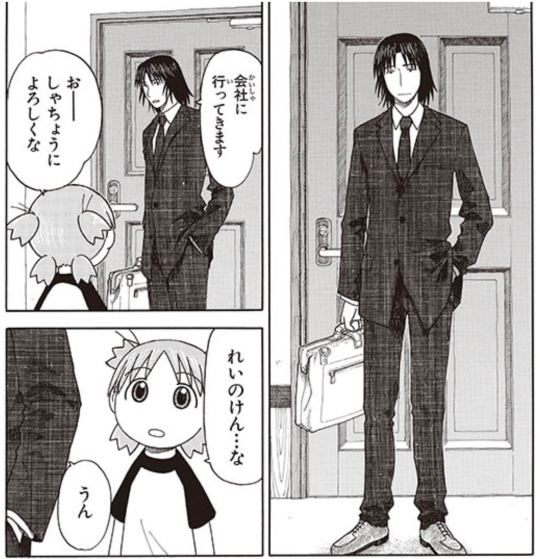
What's also interesting is that all of the other Eden kids speak "normally," using kana and kanji properly in their dialogue. This helps to convey the fact that, despite Anya being roughly the same age as them, their "rich family" upbringing has forced them to grow up faster. In the below panel, you can see how Damian's dialogue uses kanji (with furigana translations) while Anya's uses only kana, even for words that have kanji.
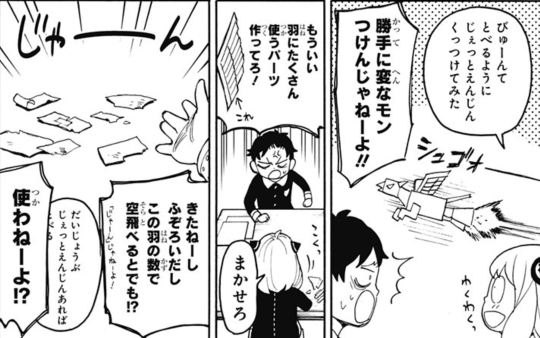
Interestingly, I found at least two cases where Anya does use kanji in her dialogue: when she's calling out the name of her big "Arrow of Light, Seize the Star" move during the dodgeball game, and when she calls out her "Lighting Bolt, Deliver my Aid" move when she tries to throw Yor's weapon back on the deck in the cruise arc. As you can see in the below panels, the names of these "moves" is written in kanji (with furigana translations). This makes sense not only because this is parodying shonen series where the characters shout out the names of their moves, but because it emphasizes how determined Anya was at these moments.

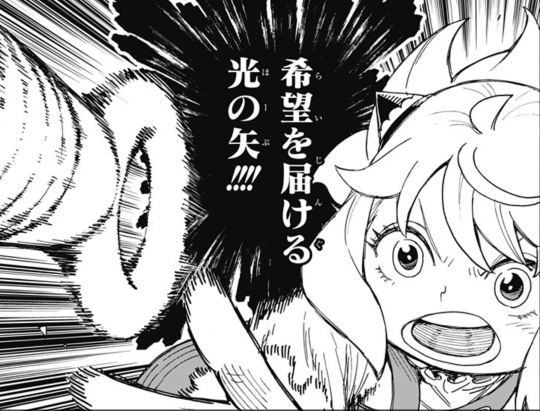
But going back to how Anya's speech compares to the other kids, another thing that stands out is that she speaks very "plainly." Her grammar is (mostly) correct, except for a few mistakes you'd expect a little kid to make. But she uses pretty much no colloquialisms, almost as if she knows the language but lacks the experience for using it in normal social interactions. I don't think this is unusual for a kid her age who's still learning, but it definitely stands out when compared to her classmates. For example, in the below panel, Becky uses normal interjections and other colloquialisms in her speech, like "ne" (ね), "wa" (わ), and "yo" (よ), which are all standard Japanese linguistic devices for softening or emphasizing your sentences. However, Anya doesn't use things like this in her speech. Again, this makes her speech come off as very plain and abrupt, almost like she's not a native speaker.
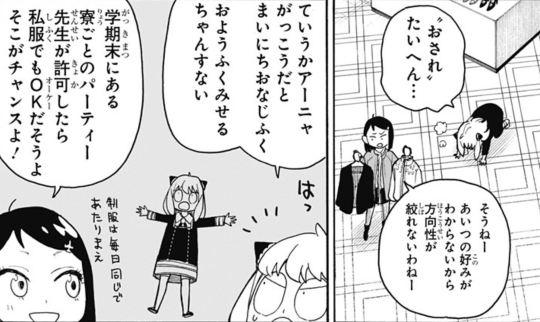
She also refers to herself in third person all the time in the Japanese version. In fact, I don't recall her ever using an "I" or "me" pronoun. I don't know why the English version of the manga doesn't keep this characteristic of her speech. I think it's very important in highlighting the childish aspect of her personality.
Putting all this together – the fact that she doesn't use typical colloquial speech and refers to herself in third person – really emphasizes the childish, naive, and almost baby-like nature of her character. I'm curious if Endo made her speak this way simply to show what a little kid she is compared to her classmates, or if it will somehow tie back to whatever roots she has in classical languages that he keeps hinting at. Regardless, as I mentioned in my full Anya analysis, what she lacks in speech and school smarts, she makes up for in empathy and resourcefulness.
Besides all this, Anya does make typical speech mistakes a normal kid would make, like mishearing words or saying things wrong. She mostly uses casual speech, but does try to use keigo (polite speech) on occasion, though not always correctly. For example, she says "ohayaimasu" (おはやいます) for "good morning" instead of "ohaiyou gozaimasu" (おはようございます).
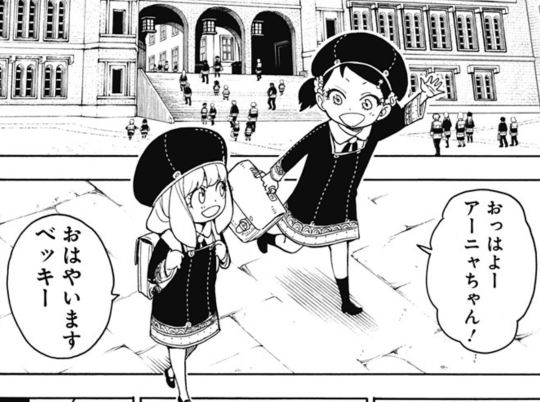
But the most consistent "mistake" she makes (though it's not really a mistake) is what she calls Loid and Yor – "chichi" (ちち) and "haha" (はは) respectively.
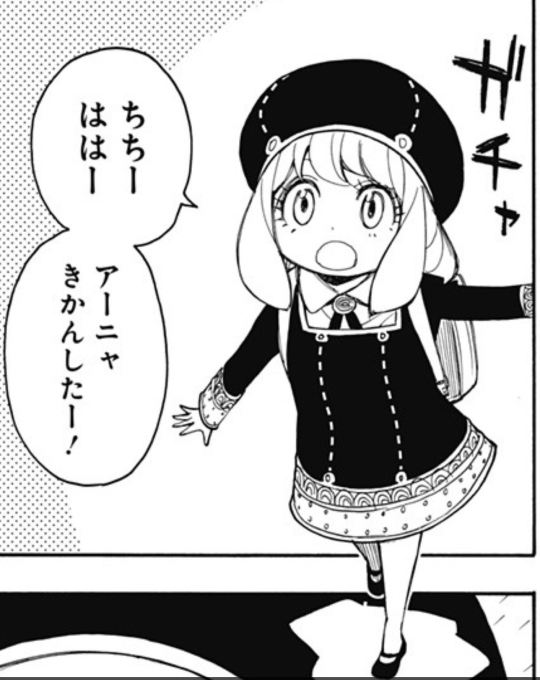
Japanese has many different words for relatives depending on whether you're talking about your own relatives or someone else's, and whether you're talking to them or about them. "Chichi" and "haha" are the general, neutral terms for "father" and "mother," and are also used when talking about your parents to someone else. However, they're not used when talking directly to your mother and father. There are many other words for that, the usual ones being "o-tou-san" (お父さん) and "o-kaa-san" (お母さん), or some variations of these with different honorifics. Damian refers to his dad as "chichi-ue" (父上) which is very formal, while Becky calls her dad the actual English word "papa" (パパ) which is very informal and normal for kids to use. But again, "chichi" and "haha" are typically only used when talking about your parents, not to them the way Anya uses them. This started from the very first chapter where Loid asks her to call him something that sounds "elite." He originally suggests the very formal "o-tou-sama" (お父さま), but when Anya says "chichi," he doesn't bother to correct her.

Hearing a little kid call her dad and mom "chichi" and "haha" is kind of like calling them "my father" and "my mother" even when speaking to them directly – it's not wrong necessarily, just strange. But again, this serves to further emphasize the childlike nature of Anya's character.
<- Return to Part 1
Continue to Part 3 ->
685 notes
·
View notes